Essays
Essays
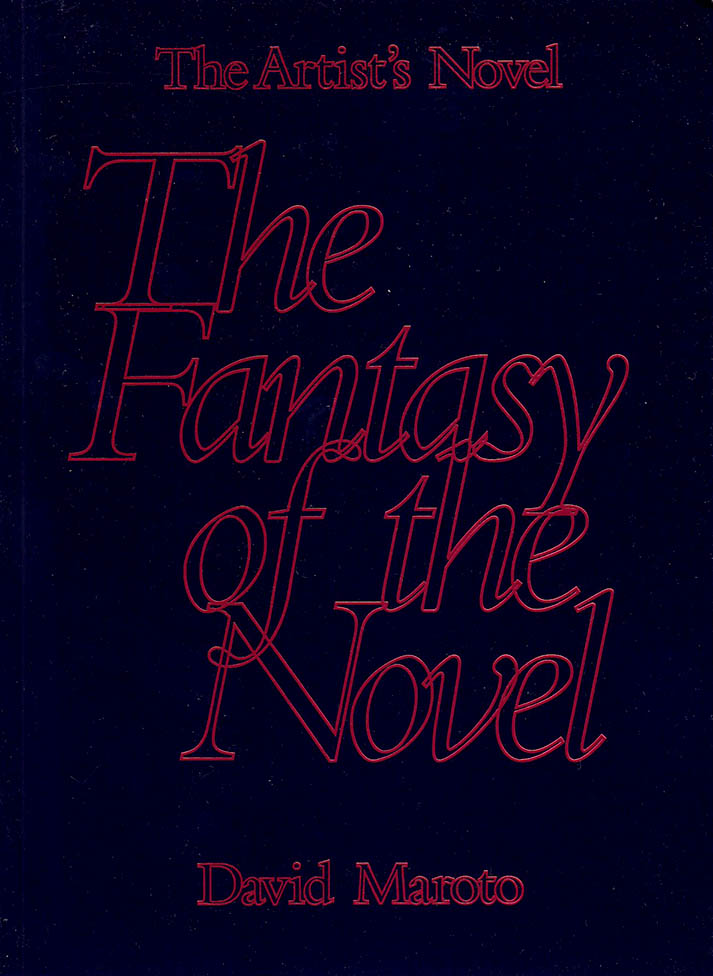
The Fantasy of the Novel
Second volume of a publication dedicated to the artist's novel, this metafiction follows a detective investigating the conditions of production of a novel within an artistic framework.
Why do artists write novels? What impact does the artist's novel have on the visual arts? How should such a novel be experienced? In recent years, there has been a proliferation of visual artists who create novels as part of their broader art practice. They do so in order to address artistic issues by means of novelistic devices, favoring a sort of art predicated on process and subjectivity, introducing notions such as fiction, narrative, and imagination. In this sense, it is possible to see the novel as a new medium in the visual arts; yet very little is known about it. This two-volume publication is the first to explore in depth the subject of the artist's novel.
The Fantasy of the Novel, is a research project in the form of a novel; it examines the process of creating an artist's novel derived from five episodic performances and an exhibition. The creative process was affected by the circumstances of production, including intersubjective relationships usually invisible to audiences. The protagonist assumes the role of a detective who tries to understand the conditions under which an artist decides to write, and how this writing is possible within an artistic setting.
David Maroto (born 1976, lives and works in Rotterdam) is a Spanish visual artist, researcher, writer, and curator. He is the co-curator of The Book Lovers, a research project on the artist's novel, together with Joanna Zielińska.
Published 2020

The Other Citizen
Drawing upon traditions of socially engaged poetics, Brandon LaBelle's The Other Citizen presents narratives of contemporary crisis and exclusionary politics—from American teenagers in the maze of neoliberal privatization to those caught between borders of nation-states—outlining the force of a planetary citizenry.
Brandon LaBelle is a musician, artist, writer, theorist, curator and editor (founder of Errant Bodies). His work is based on performance, sound installation, recording and use of found sounds. LaBelle reflects fluently on his artistic practice, drawing attention to the social dimensions of listening and manner in which sounds, in multiple variations, play upon public spaces, and drawing connections across media and incorporate video, as well as architectural and sculptural vocabularies into an expanded field that embraces rhetorical and spatial challenges.
Published September 2020.

The Nomadic Listener
Based on the author's artistic research on migration, contemporary urban experience, and sonic alienation, The Nomadic Listener is composed of a series of texts stemming from psychogeographic explorations of contemporary cities, including Copenhagen, Berlin, Kolkata, Vienna, Delhi, Hong Kong, Mumbai, and New York, among others.
Each text is an act of listening, where the author records his surrounding environment and attunes to the sonic fluctuations of movement and the passing of events. What surfaces is a collection of meditations on the occurrences of life movingly interwoven with memories, associations, desires and reflections. As readers we are brought into a tender map of contemporary urban experience, and the often lonely, surprising, and random interactions found in traveling. The Nomadic Listener includes parallel drawings based on the original audio recordings, and appear as ghostly renderings of the corresponding experiences. The recordings are published by Gruenrekorder and accessed through a QR code included in the book.
Budhaditya Chattopadhyay is a contemporary artist, researcher, writer and theorist. Incorporating diverse media, such as sound and moving image, Chattopadhyay produces works for large-scale installation and live performance addressing urgent issues such as the climate crisis, human intervention in the environment and ecology, migration, race, and decolonization.
published September 2020.
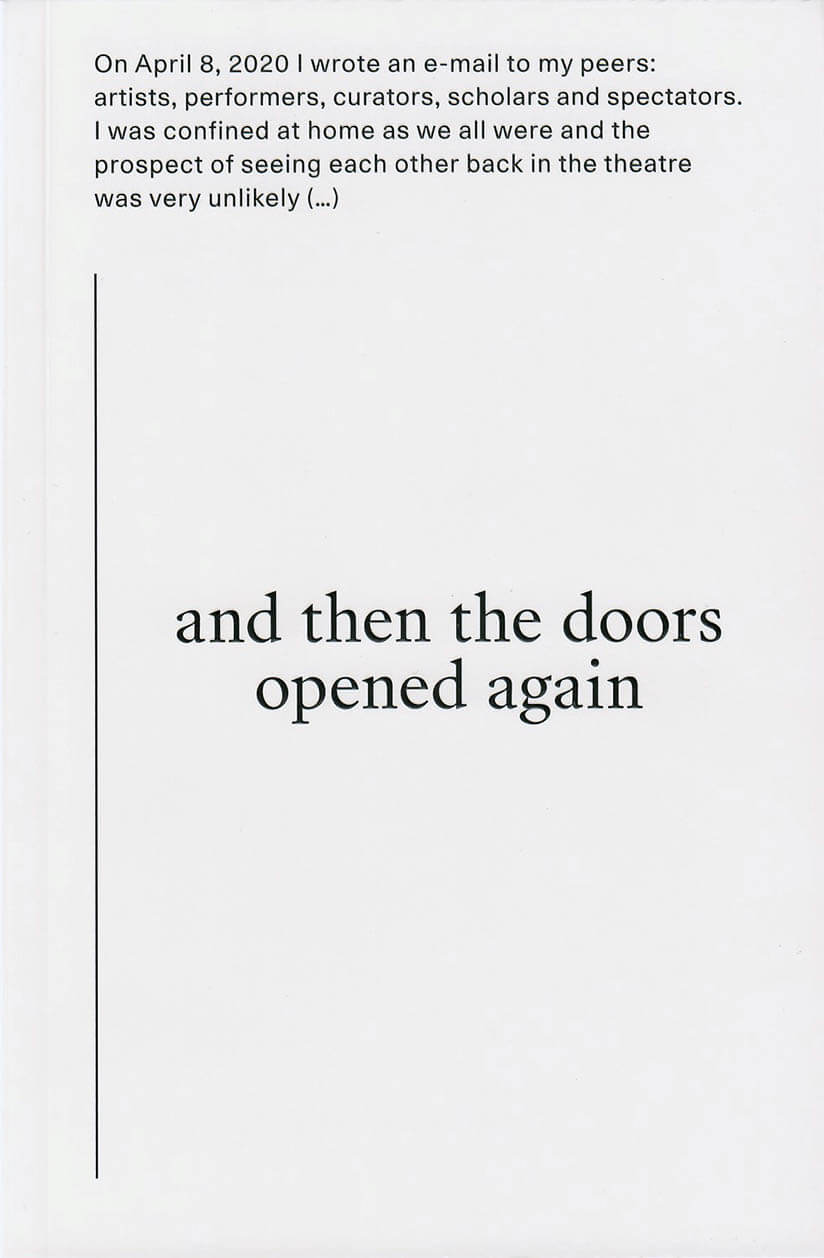
and then the doors opened again
Locked down at home during the first wave of Covid-19, David Weber-Krebs kept on thinking about the day when theatres would open their doors again. At that point, it was somehow difficult to even picture that moment.
On the 8th of April, 2020, in the middle of the lockdown, David sent an e-mail to his peers: artists, scholars, curators, and spectators belonging to different art communities. In this e-mail, there was a simple question: What will happen on your first theatre visit after the lockdown?
It was an invitation to imagine the future of theatre from this very specific moment when theatres were all closed and when it was not clear how and when and if they would open again.
With contributions by: Paula Almiron, Kristof van Baarle, Sven Age Birkeland, Antonia Baehr, Caroline Barneaud, Nicole Beutler, Maaike Bleeker, Julien Bruneau, Pieter De Buysser, Alondra Castellanos, Chloé Chignell, Amélie Coster, Jasper Delbecke, Zoë Demoustier, Wouter De Raeve, Charlotte De Somviele, Katja Dreyer, Jeroen Fabius, Silvia Fanti, Far, Nicolas Galeazzi, Emilie Gallier, Nada Gambier, Melih Gencboyaci, Konstantina Georgelou, Kristof van Gestel, Matthieu Goeury, Maximilian Haas, Ant Hampton, David Helbich, Marijke Hoogenboom, Rita Hofwijk, Breg Horemans, Asa Horvitz, Dolores Hulan, Mette Ingvartsen, Myriam Van Imschoot and Marcus Bergner (MM), Stefan Kaegi, Edyta Kozak, Bojana Kunst, Rudi Laermans, Sarah van Lamsweerde, Heike Langsdorf, Mylène Lauzon, André Lepecki, Kopano Maroga, Ivana Müller, Phoebe Osborne, Leonie Persyn, Julie Pfleiderer, Antoine Pickels, Amanda Piña, Jan-Philipp Possmann, Fransien van der Putt, Irena Radmanovic, Anna Rispoli, Martina Ruhsam, Jonas Rutgeerts, Nienke Scholts, Ula Sickle, Michael Simon, Karoline Skuseth, Lara Staal, Christel Stalpaert, Danae Theodoridou, Pankaj Tiwari, Vera Tussing, Marie Urban, Michiel Vandevelde, Hidde Aans Verkade, Mathilde Villeneuve, Georg Weinand, Stefanie Wenner, Siegmar Zacharias, Andros Zins-Browne.

on the future and the artist-run spaces
Artists, curators and writers describe their vision on the role of artist-run spaces for the future and discuss their own position in the world of art. The authors weigh in on the importance of artist-run spaces and reach out to anyone looking for alternative ways of thinking, working and living together.

a queer anthology of healing
a queer anthology of healing is a subtle, devastating mix of cuteness and embarrassment, beauty and confession, magic tricks and pain. The artworks and writings in this collection suggest that healing can be achieved through revelation, invocation, observation and disclosure. It’s a much-needed gift right now. - Chris Kraus
with Clay AD, Harry Agius, Barney Ashton-Bullock, Bodie Bellamy, Jack Bigglestone, Nick Blackburn, Helen Cammock, Charity Coleman, Swithun Cooper, Paul Gabrielli, Evan Garza, Erica Gillingham, Daniel Givens, Pete Hammond, Benedict Hawkins, Georgie Henley, Lubaina Himid, Fanny Howe, Jasmine Johnson, G.B. Jones, Kevin Killian, Wayne Koestenbaum Nic Lachance Olivia Laing, Benedict Leader, Paul Lee, Mary Manning, Ben Miller, D. Mortimer, Monique Mouton, Annie Murrells, Chuck Nanney, David Nas, Isobel Neviazsky,Paul P. , Richard Porter,Peter Scalpello, Hyacinth Schuss, Ryan Skelton, Verity Spott, Edward Thomasson, Timothy Thornton, Declan Wiffen, Ian Wooldridge

Just Us: An American Conversation
As everyday white supremacy becomes increasingly vocalized with no clear answers at hand, how best might we approach one another? Claudia Rankine, without telling us what to do, urges us to begin the discussions that might open pathways through this divisive and stuck moment in American history.
Just Us is an invitation to discover what it takes to stay in the room together, even and especially in breaching the silence, guilt, and violence that follow direct addresses of whiteness. Rankine’s questions disrupt the false comfort of our culture’s liminal and private spaces—the airport, the theater, the dinner party, the voting booth—where neutrality and politeness live on the surface of differing commitments, beliefs, and prejudices as our public and private lives intersect.
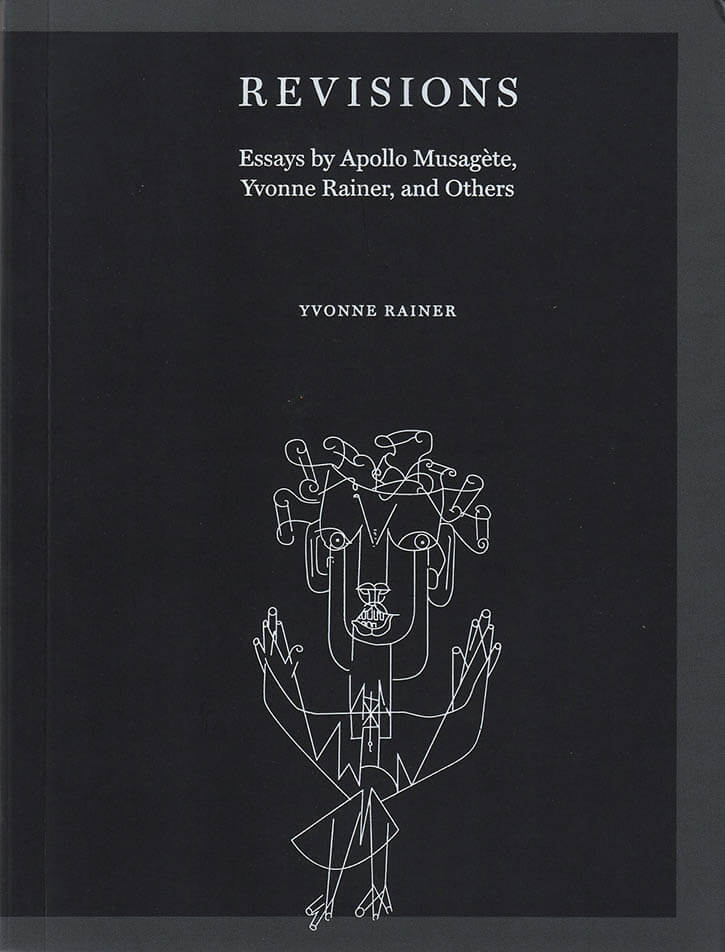
Revisions
The final iteration of Rainer's dance rant A Truncated History of the Universe for Dummies, accompanied by texts offering a real-time account of Rainer's creative process.
Choreographer and filmmaker Yvonne Rainer has long investigated the ways in which movement can be a political act in and of itself—on the stage, on the screen, or at the lectern. In Revisions, Rainer pushes her interest in embodied activism to a new arena: what she calls the “dance rant.” This volume includes the final iteration of Rainer's latest dance rant, entitled A Truncated History of the Universe for Dummies. This performance piece evolved in live presentations in Dublin, Stockholm, and New York before being expanded and adapted in written form here. In this now-completed work, Rainer mobilizes her rage and bafflement at contemporary political events through the guise of Apollo, Leader of the Muses.
Revisions also includes a compilation of emails and diary entries that provide a real-time account of Rainer's process of creating and workshopping a dance. “Pedagogical Vaudeville 3” reveals Rainer's consistent interest in reworking and reconsidering material across multiple mediums, formats, and contexts, and offers a unique glimpse at the working methods of one of this century's preeminent dance artists.
Bookended with an introduction by artist and scholar Gregg Bordowitz and an analysis of Rainer's AG Indexical with a Little Help from H. M. by dance historian Anna Staniczenko, these texts serve not only as a revision of the conventional understanding of five decades of Rainer's production, but also as a timely manual for performance as an act of resistance.

Thresholes
THRESHOLES is both a doorway and an absence, a road map and a remembering. In this almanac of place and memory, Lara Mimosa Montes explores the passage of time, returning to the Bronx of the ’70s and ’80s and the artistry that flourished there. What is the threshold between now and then, and how can the poet be the bridge between the two? Just as artists of that time highlighted what was missing in the Bronx, this collection examines what is left open in the wake of trauma and loss.
Lara Mimosa Montes is a writer based in Minneapolis and New York. Her poems and essays have appeared in Academy of American Poets’ Poem-A-Day, BOMB, Boston Review, Hyperallergic, Jacket2, and elsewhere. She is a 2018 McKnight Writing Fellow and CantoMundo Fellow. She holds a PhD in English from The Graduate Center, City University of New York. Currently, she works as a senior editor of Triple Canopy. She was born in the Bronx.
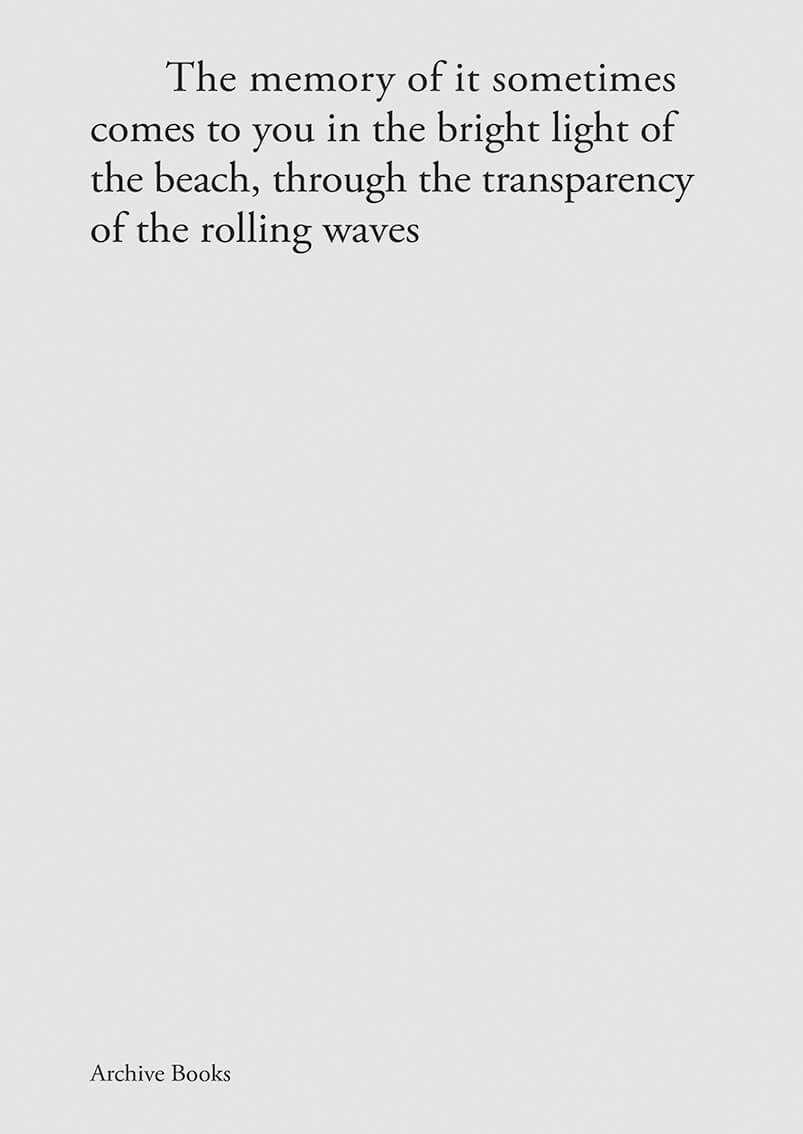
Encircling the Image of Trauma
This book tiptoes between aesthetics and ethics; it proposes to rethink trauma in its necessity as well as impossibility to be represented and understood.
The traumatic experience of violence marks social orders and imbues history. How does it reach beyond distress and pain? This collection of works interrogates alternative narratives: The traces of trauma may also comprise a subversive potential, which withdraws from the hold of power and instead makes room for a sense of history's vulnerability.
Thoughts, artistic contributions and text, most of them produced especially for this volume, move around notions of trauma, in an attempt to encircle moments, at which translation of meaning seems suddenly suspended.
Contributions by Pavel Büchler, Anca Benera & Arnold Estefan, Wendelien van Oldenborgh, Jenny Edkins, Aurélien Gamboni & Sandrine Teixido, Unica Zürn, Falke Pisano, Katja Mater, Georges Perec, Andrea Bellu, Ben Seymour, Natascha Sadr Haghighian, Gitte Villesen.
Published with Centre d'Art Contemporain Genève.
published in March 2020
English edition
13 x 20 cm (softcover)
240 pages (ill.)
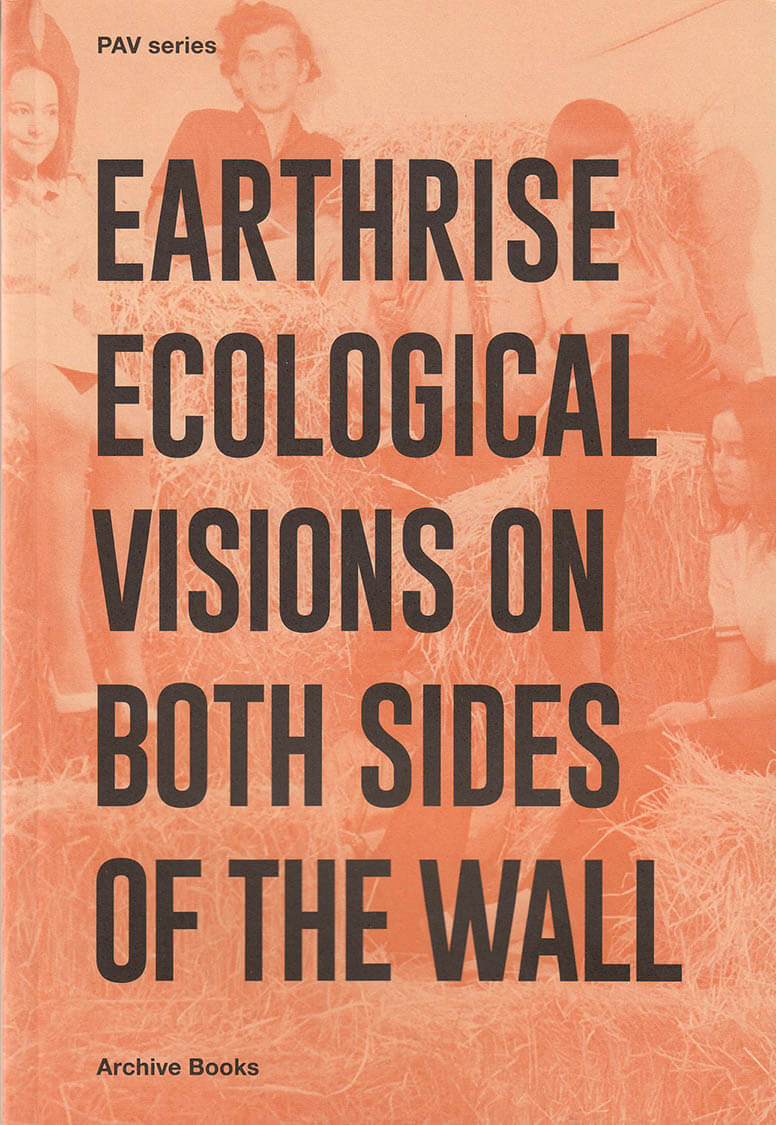
Earthrise
There is no question that ecological ideas acquired a central role in contemporary episteme. In contrast, the heuristic function that these ideas can assume in the current polarisation is questionable: that which, over the last decade, has identified the environmental crisis with the (categorical and totalitarian) concept of the Anthropocene.
Ecological discourse positioned itself inside historically situated trajectories that contributed to the transformation of aesthetical paradigms and political practices. In the scenario that 1968 opened up, the transversal nature of subjectivity allowed it to cover different fields, beginning with the tension between the logic of a unitary discourse and the creation of a multiplicity of possible worlds, between the molar and the molecular, the micro and the macro.
Ecological thought, as such, cannot help but conflict with that which is assumed to be homogeneous and constant, with that which forces the earth to be centred, measured, and expropriated, just as life must be biogenetically controlled, colonised, and subjected to patriarchy.
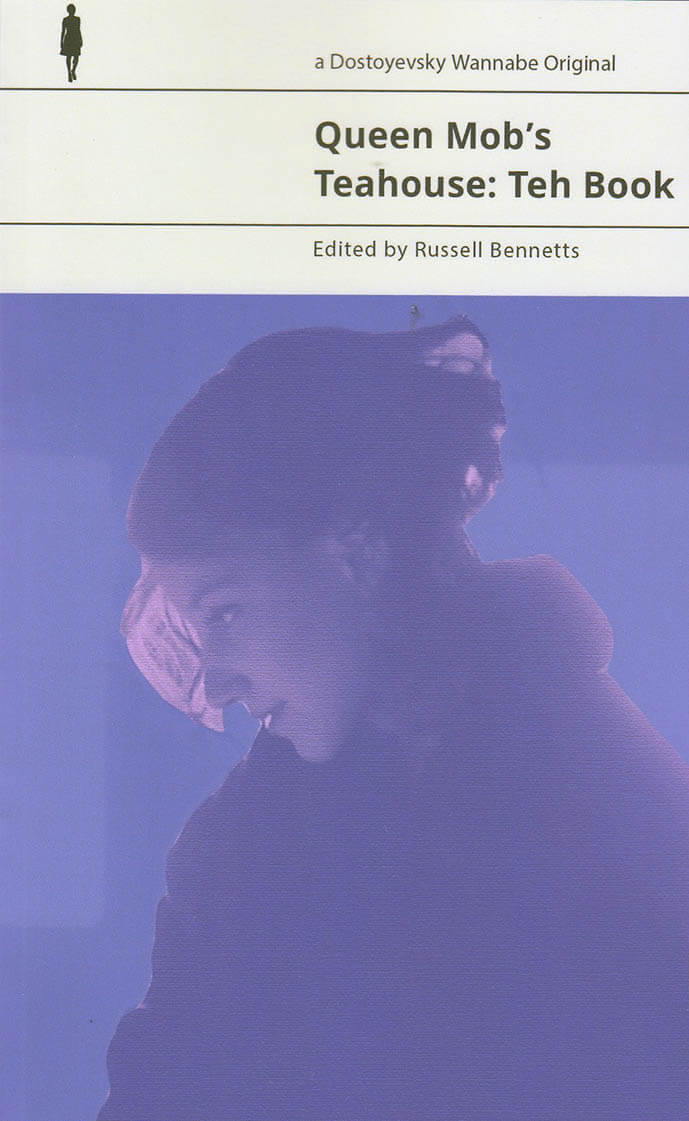
Queen Mob's Teahouse: Teh Book
Queen Mob's Teahouse is an online literary magazine. Queen Mob's Teahouse: Teh Book is this volume. All new, no doubts.
"Everyone has come for tea! Poets, robots, literary critics, essayists, philosophers and clouds, beamed in from around the world to think about a new order and remind you that literature really is the cure for what ails you. A humane and diverse collection of voices getting to grips with their human condition, and yours, and the end of the world, too." - Octavia Bright, co-host of Literary Friction
Queen Mob's Teahouse: Teh Book was edited by Russell Bennetts and features work by the following authors.
Setsuko Adachi, Rion Amilcar Scott, Russell Bennetts, Gem Blackthorn, Robert Boucheron, M. Soledad Caballero, Caroline Cabrera, S Cearley, Dorothy Chan, Trinie Dalton, Dana Dawud, Amanda Earl, Icess Fernandez Rojas, Jeremy Fernando, Claire Rudy Foster, SJ Fowler, Patricia Garcia, Mark Gluth, Eloise Grills, Allison Grimaldi-Donahue, Brinda Gulati, Judson Hamilton, Susan Harlan, Heather Hughes, Erik Kennedy, Naveen Kishore, Rauan Klassnik, Virginia Konchan, Keith Kopka, Nate Lippens, Reb Livingston, Marissa Maciel, Scott Manley Hadley, rob mclennan, Jasminne Mendez, Lupe Mendez, Calliope Michail, Thomas Molander, Deborah D.E.E.P. Mouton, Jason Novak, Emily O’Neill, Elizabeth Onusko, Robyn Maree Pickens, Whiskey Radish, Colin Raff, Reyes Ramirez, Christina M. Rau, Raquel Salas Rivera, Vlad Savich, Michael J Seidlinger, Medha Singh, George Szirtes, Eileen R. Tabios, Chris Tse, Leah Umansky, Nadia de Vries and Kimmy Walters.
Cover design and finishing touches on the typesetting by Shuwei Bennetts and Dostoyevsky Wannabe. Cover photo of Julia Frakes by Kathryn LeSoine.
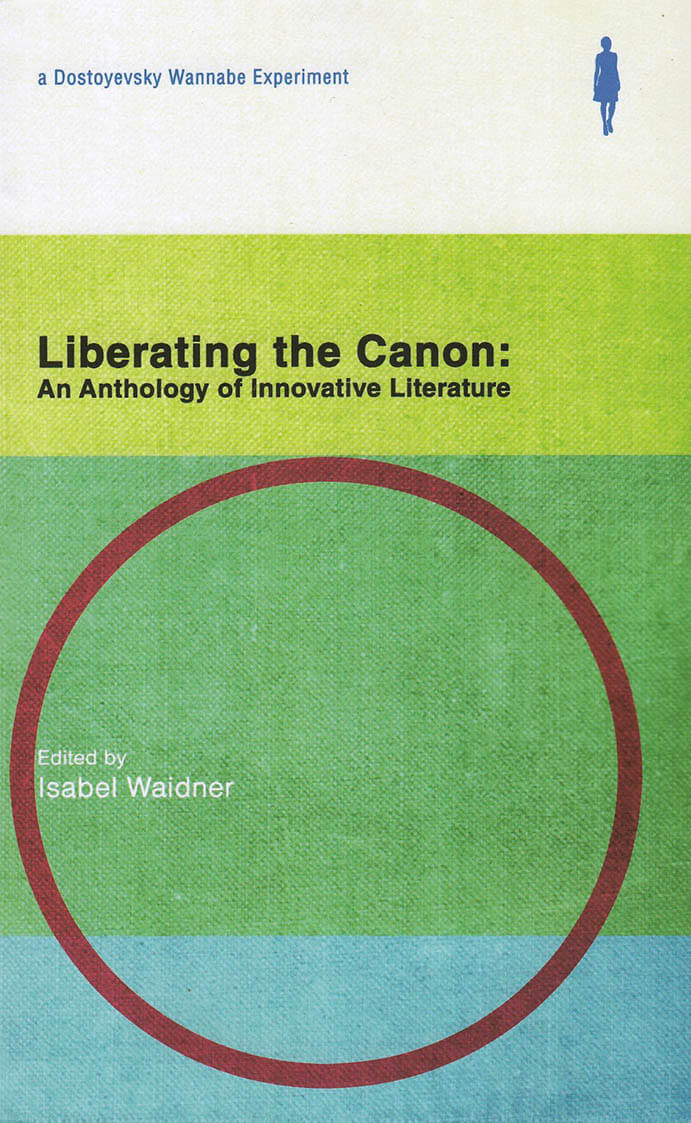
Liberating the Canon
Liberating the Canon is an edited anthology capturing the contemporary emergence of radically innovative and nonconforming forms of literature in the UK and US. Historically, sociopolitical marginalisation and avant-garde aesthetics have not come together in UK literature, counterintuitively divorcing outsider experience and formal innovation. Bringing together intersectional identity and literary innovation, LTC is designed as an intervention against the normativity of literary publishing contexts and the institution 'Innovative Literature' as such. More widely, if literature, any literature, can act as a mode of cultural resistance and help imagine a more progressive politics in Tory Britain and beyond, it is this.
Contributors are Mojisola Adebayo, Jess Arndt (US), Jay Bernard, Richard Brammer, Victoria Brown, SJ Fowler, Juliet Jacques, Sara Jaffe (US), Roz Kaveney, R. Zamora Linmark (US), Mira Mattar, Seabright D.Mortimer, Nat Raha, Nisha Ramayya, Rosie Snajdr, Timothy Thornton, Isabel Waidner, Joanna Walsh and Eley Williams.
Isabel Waidner is a writer and cultural theorist. She is the author of three books of innovative fiction, most recently Gaudy Bauble (Dostoyevsky Wannabe, 2017), which is currently longlisted for the Republic of Consciousness Prize for "hardcore literary fiction and gorgeous prose". Her articles and short fictions have appeared or are forthcoming in journals including 3: AM, Berfrois, Configurations, The Happy Hypocrite, The Quietus and Minor Literature[s]. She is also the editor of Liberating the Canon: An Anthology of Innovative Writing (Dostoyevsky Wannabe, 2018) which explores the relationship between identity, intersectionality and innovation in literature. As part of the indie band Klang, Waidner released records on UK labels Rough Trade (2003) and Blast First (2004). She is a lecturer in English and Creative Writing at Roehampton University, London, UK.
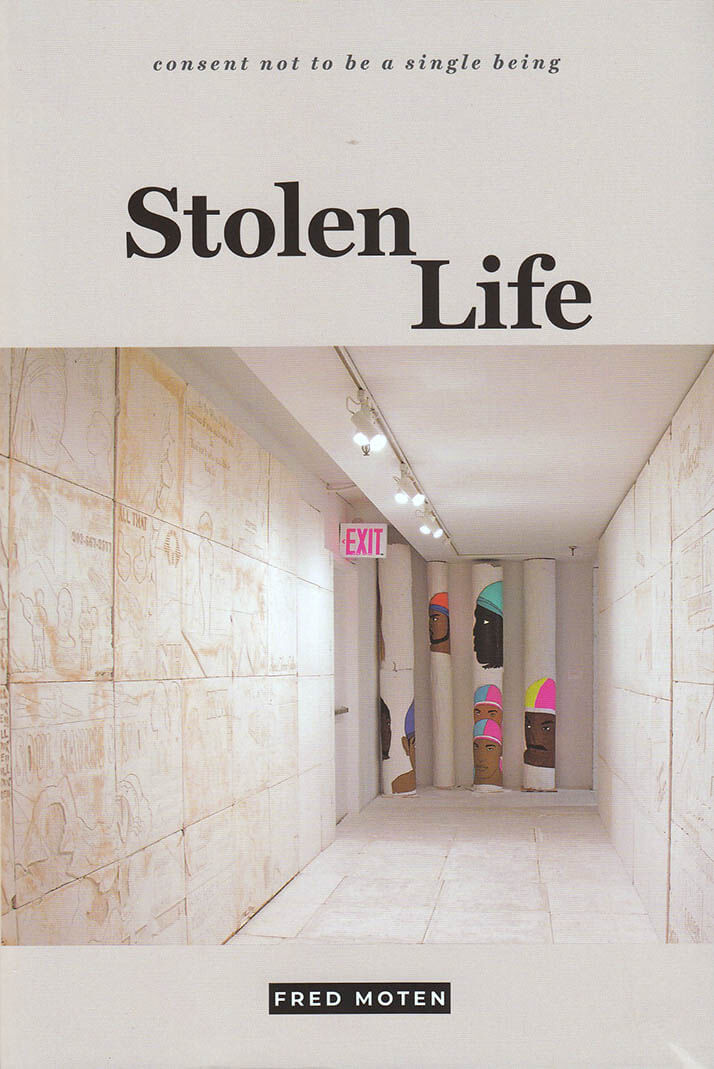
Stolen Life
In Stolen Life—the second volume in his landmark trilogy consent not to be a single being—Fred Moten undertakes an expansive exploration of blackness as it relates to black life and the collective refusal of social death. The essays resist categorization, moving from Moten's opening meditation on Kant, Olaudah Equiano, and the conditions of black thought through discussions of academic freedom, writing and pedagogy, non-neurotypicality, and uncritical notions of freedom.
Moten also models black study as a form of social life through an engagement with Fanon, Hartman, and Spillers and plumbs the distinction between blackness and black people in readings of Du Bois and Nahum Chandler. The force and creativity of Moten's criticism resonate throughout, reminding us not only of his importance as a thinker, but of the continued necessity of interrogating blackness as a form of sociality.
"2018 must go down for me as the year of Fred Moten’s trilogy: Black and Blur, Stolen Life, and The Universal Machine. You could say they’re essays about art, philosophy, blackness, and the refusal of social death, but I think of them more as a fractal universe forever inviting immersion and exploration, a living force now inhabiting my bookshelf." — Maggie Nelson, Bookforum
Fred Moten is Professor of Performance Studies at New York University and the author of Black and Blur and The Universal Machine, both also published by Duke University Press, and In the Break: The Aesthetics of the Black Radical Tradition.
Published July 2018
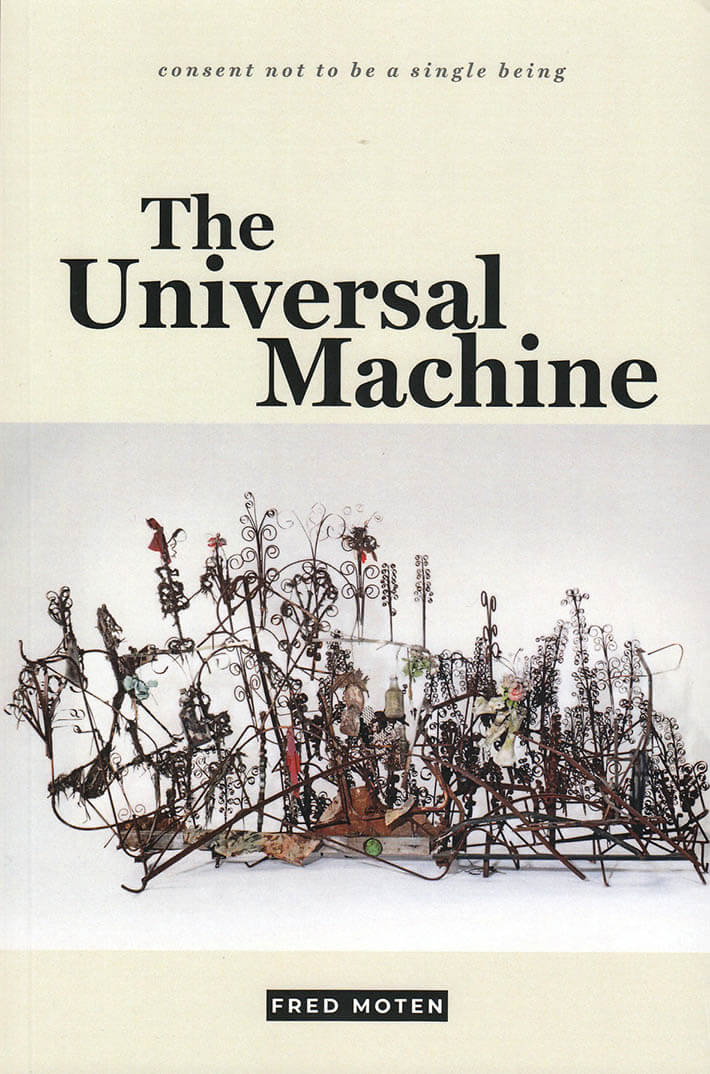
The Universal Machine
In The Universal Machine — the concluding volume to his landmark trilogy consent not to be a single being — Fred Moten presents a suite of three essays on Emmanuel Levinas, Hannah Arendt, and Frantz Fanon, in which he explores questions of freedom, capture, and selfhood. In trademark style, Moten considers these thinkers alongside artists and musicians such as William Kentridge and Curtis Mayfield while interrogating the relation between blackness and phenomenology.
Whether using Levinas's idea of escape in unintended ways, examining Arendt's antiblackness through Mayfield's virtuosic falsetto and Anthony Braxton's musical language, or showing how Fanon's form of phenomenology enables black social life, Moten formulates blackness as a way of being in the world that evades regulation. Throughout The Universal Machine—and the trilogy as a whole—Moten's theorizations of blackness will have a lasting and profound impact.
Published July 2018
Fred Moten is Professor of Performance Studies at New York University and the author of Black and Blur and Stolen Life, both also published by Duke University Press, and In the Break: The Aesthetics of the Black Radical Tradition.
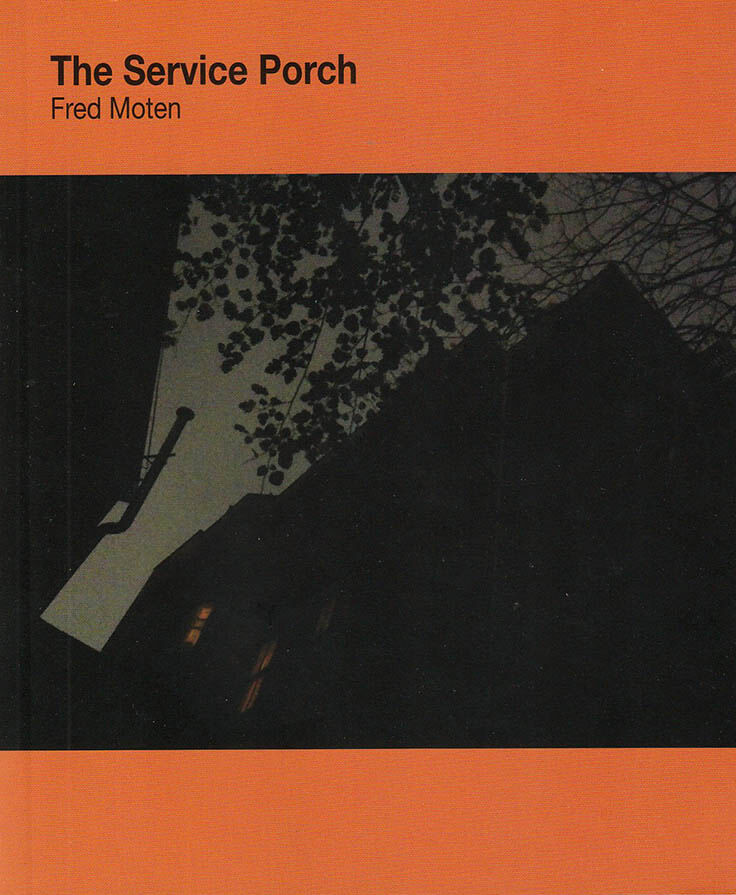
The Service Porch
The third and final volume of Fred Moten's poetic trilogy (including THE FEEL TRIO and The Little Edges), THE SERVICE PORCH is an expansive meditation on black life, love, violence, and the adventure of making art.
National Book Award-Finalist, Moten returns here to reinvent some of his earliest poetic visions and strikes up a conversation with many of the most brilliant African American visual artists through a series of epistolary and ekphrastic poems. By turns mournful, tender, ferocious, and heart-breakingly honest, THE SERVICE PORCH is an open letter, a play list, and a hive of prayer and joy.
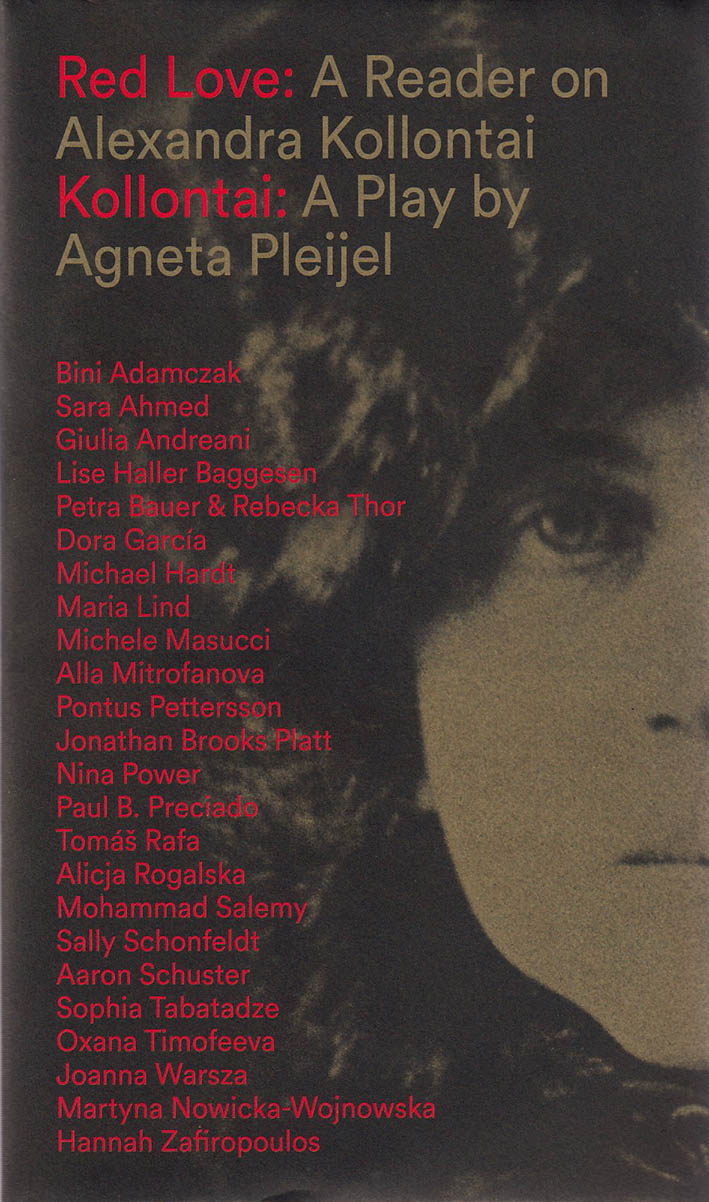
Red Love: A Reader on Alexandra Kollontai / Kollantai: A Play by Agneta Pleijel
Joanna Warsza, Michele Massucci and 1 more
Alexandra Kollontai was a Russian revolutionary who was appointed commissar of social welfare after the October Revolution and later one of the world’s first woman ambassadors. She fought for abortion rights, secularized marriage, and paid maternity leave—and considered “comradely love” to be a political force. This reader, in which artists and thinkers revisit Kollontai’s legacy in light of current feminist struggles, stems from a research project by CuratorLab at Konstfack and Tensta konsthall that accompanied Dora García’s exhibition “Red Love.” It also features the first English translation of the 1977 biographical play Kollontai by Swedish writer Agneta Pleijel.
Edited by MARIA LIND, MICHELE MASUCCI, JOANNA WARSZA
Contributions by BINI ADAMCZAK, SARA AHMED, GIULIA ANDREANI, LISE HALLER BAGGESEN, DORA GARCÍA, MICHAEL HARDT, MARIA LIND, MICHELE MASUCCI, ALLA MITROFANOVA, MARTYNA NOWICKA-WOJNOWSKA, PONTUS PETTERSSON, JONATHAN BROOKS PLATT, AGNETA PLEIJEL, NINA POWER, PAUL B. PRECIADO, THOMAS RAFA, ALICJA ROGALSKA, MOHAMMAD SALEMY, SALLY SCHONFELDT, AARON SCHUSTER, SOPHIA TABATADZE, PETRA BAUER & REBECKA THOR, OXANA TIMOFEEVA, JOANNA WARSZA, HANNAH ZAFIROPOULOS

The Annotated Reader
Jonathan P. Watts, Ryan Gander
The Annotated Reader is a publication-as-exhibition and exhibition-as-publication featuring 281 creative personalities responses and remarks on a chosen piece of writing.
Ryan Gander and Jonathan P. Watts invited a range of people, encompassing contemporary artists, designers, writers, institutional founders, musicians and so on – to imagine they’ve missed the last train.
“Is there one piece of writing that you would want with you for company in the small hours?” With this in mind, we asked people to submit a text with personal annotations and notes made directly onto it.
With over 281 contributions collected over the last few months, we have gathered a selection of contributors including Marina Abramović, Art & Language, Paul Clinton, Tom Godfrey, Ragnar Kjartansson, Sarah Lucas, Alistair Hudson and Hans Ulrich Obrist. The annotation adds a further layer, making each piece unique and a historic record of our current times.
Contributors:
Julian Abraham, Marina Abramović, Larry Achiampong, Saâdane Afif, Aaron Angell, Spencer, Anthony, Rachel Ara, Uri Aran, Cory Arcangel, Ellie Armon, Art & Language (Michael Baldwin, Mel Ramsden), François Aubart, Mary Aurory, Giles Bailey, Dan Baldwin, Fiona Banner, Simeon, Barclay, Anna Barham, Alvaro Barrington, Vanessa Bartlett, David Batchelor, Jacqueline Bebb, James Beckett, Frank Benson, Hans Berg, Emilia Bergmark, Vanessa Billy, Harry Bix, Juliette Blightman, John Bloomfield, John Bock, Doug Bowen, Benjamin Brett, Jack Brindley, Jim Broadbent, Yoko Brown, Hannah Brown, Stefan Brüggemann, Savinder Bual, Pavel Büchler, Nathaniel Budzinski, Gregory Burke, Wayne Burrows, Nikita Yingqian Cai, Mira Calix, Helen Cammock, Banu Cennetoglu, Tony Chambers, Rachael Champion, Alice Channer, Lou Cantor, Adam Chodzko, Perienne Christian, Martin Clark, Kaavous Clayton, Paul Clinton, Lucy Clout, William Cobbing, Gary Colclough, Beth Collar, Jack Cooke, May Cornet, Cel Crabeels, Paul Crook, Rob Crosse, Abraham Cruzvillegas, Francois Curlet, Matt Darbyshire, Matthew de Kersaint Giraudeau, Gabriele De Santis, Poppy De Villeneuve, Richard Deacon, Liu Ding, Stevie Dix, Nathalie Djurberg, Gabor Domokos, Lauren Doughty, Helen Dowling, Joe Dunthorne, Sam Durant, Daniel Eatock, Shannon Ebner, Sean Edwards, George Eksts, Olafur Eliasson, gerlach en koop, Vivo Enky, Gareth Evans, Alice Andrea Ewing, Sam Falls, Abbe Faria, Chantal Faust, Jes Fernie, Spencer Finch, Alice Fisher, Chris Fite-Wassilak, Sal Fontaine, Tim Foxon, Mary Furniss, Ryan Gander, Mark Geffriaud, Alessandra Genualdo, Amir George, Alexie Glass-Kantor, Patrick Goddard, Tom Godfrey, Antony Gormley, Agatha Gothe-Snape, Rodney Graham, Lavinia Greenlaw, Hannah Gregory, Joseph Grigely, Corey Hayman, Richard Hayward, Louise Hayward, Louis Henderson, Holly Hendry, Camille Henrot, Susan Hiller, Andy Holden, Ashley Holmes, David Horvitz, Alistair Hudson, Craig Hudson, Candice Jacobs, Glen Jamieson, Tess Jaray, Appau Jnr Boakye-Yiadom, Sophie Jung, John Kaldor, Allison Katz, Jasleen Kaur, Jonathan Kemp, Sharon Kivland, Ragnar Kjartansson, Lorenz Klingebiel, Matthew Krishanu, Gabriel Kuri, Zak Kyes, Emily LaBarge, Suzanne Lacy, Max Lamb, Abigail Lane, Hannah Lees, Gabriel Lester, Jenny Lindblom, Hanne Lippard, Tom Lock, Sarah Lucas, Georgia Lucas, vanessa maltese, Shepherd Manyika, Céline Manz, Michael, Marriott, Rui Mateus Amaral, Midori matsui, Rebecca May Marston, Niall McClelland, Chris McCormack, Luke Mccreadie, Francis McKee, Bea McMahon, Harry Meadley, Nathaniel Mellors, Jo Melvin, Mathieu Mercier, Daisuke Miyatsu, Jonathan Monk, Jade Montserrat, Brian Moran, Franzi Mueller Schmidt, Clive Myrie, Hiroyuki Nakanishi, Shahryar Nashat, Daniel Neofetou, Kate Newby, Simon Newby, John Henry Newton, Olaf Nicolai, Helen Nisbet, Ryan Noon, Hana Noorali, Sophie Nys, Alek O, Hans Ulrich Obrist, Harold Offeh, Ahmet Ögüt, Ima-Abasi Okon, Vanessa Onwuemezi, David Osbaldeston, Kate Owens, Jonathan P. Watts, Barnie Page, Christodoulos Panayiotou, Francesco Pedraglio, Hannah Perry, Sybella Perry, Pratchaya Phinthong, Rachel Pimm, Emily Pope, Sam Porritt, Liv Preston, Paul Purgas, Tobias Rehberger, Pedro Reyes, Emily Richardson, Jacques Rogers, #Additivism Daniel Rourke, ryanna projects (Anna Gray and Ryan Wilson Paulsen), syndicate (Sacha Leopold and François Havegeer), Giorgio Sadotti, prem sahib, Anri Sala, Margaret Salmon, Lucy A. Sames, Eran Schaerf, Annelore Schneider, Barry Schwabsky, Stephen Sheehan, Amy Sherlock, Anj Smith, John Smith, Bob and Roberta Smith, Renee So, Rustan Söderling, Nedko Solakov, Sriwhana Spong, Elinor Stanley, Georgina Starr, Astrid Stavro, Amy Stephens, Michael Stevenson, Jack Strange, Alfie Strong, Jamie Sutcliffe, Maki Suzuki, Rayyane Tabet, Mika Tajima, Lynton Talbot, Sally Tallant, Anne Tallentire, Maria Taniguchi, The Floors (Luke Dux, Ryan Dux and Ashley Doodkorte), Alice Theobald, Sam Thorne, Cara Tolmie, Marie Toseland, Rosemarie Trockel, Thom Trojanowski Hobson, Simon Turnbull, Lauren Velvick, Dana Venezia, Martin Vincent, Yonatan Vinitsky, Miriam Visaczki, Frances von Hofmannsthal, John Walter, Dan Walwin, Jessica Warboys, Ossian Ward, Evie Ward, Emily Wardill, Emily Warner, Nicholas Fox Weber, Lawrence Weiner, Charlott Weise, Richard Wentworth, Pae White, Riet Wijnen, Lillian Wilkie, Holly Willats, Issy Wood, Bill Woodrow, Seymour Wright, Shen Xin, Samson Young, Bruno Zhu, Andrea Luka Zimmerman, Andrea Zucchini, Heidi Zuckerman
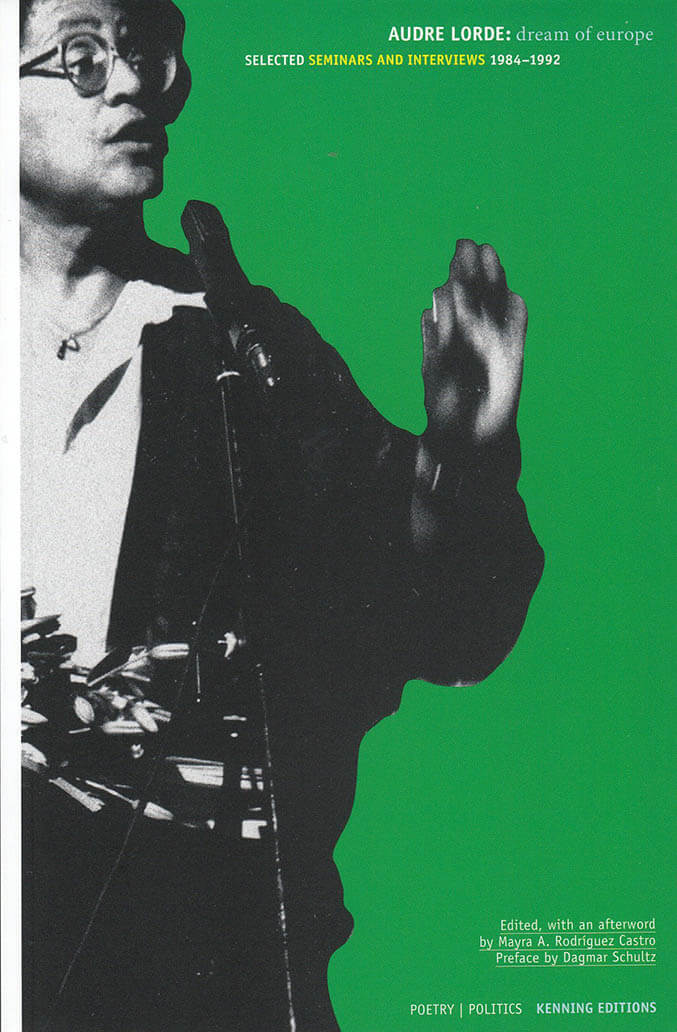
Dream of Europe: Selected Seminars and Interviews: 1984-1992
Dream of Europe elucidates Lorde's methodology as a poet, mentor, and activist during the last decade of her life. This volume compiles a series of seminars, interviews, and conversations held by the author and collaborators across Berlin, Western Europe, and The Caribbean between 1984-1992.
While Lorde stood at the intersection of various historical and literary movements in The United States—the uprising of black social life after the Harlem Renaissance, poetry of the AIDS epidemic, and the unfolding of the Civil Rights Movement—this selection of texts reveals Lorde as a catalyst for the first movement of Black Germans in West Berlin. The legacy of this "Black, lesbian, mother, warrior, poet" has been well preserved by her colleagues in Germany.
These selected writings lay bare struggles, bonds, and hopes shared among Black women in a transnational political context, as well as offering sometimes surprising reflections on the US American counter culture with which Lorde is associated. Many of the poems that were important to Lorde's development are excerpted in full within these pages, serving as a sort of critical anthology.
Audre Lorde (1934-1992) published over a dozen books of poetry, a novel, and several volumes of essays, including From a Land Where Other People Live (1972), which was nominated for a National Book Award. Her later works include Coal (1976), The Black Unicorn (1978), and ZAMI: A New Spelling of My Name (1982). Her critical essays, such as "Poetry Is Not A Luxury," have received world recognition, urging generations to come into their own voices. Her work has recently been published in DREAM OF EUROPE: SELECTED SEMINARS AND INTERVIEWS: 1984-1992 (Kenning Editions, 2020) and SISTER LOVE: THE LETTERS OF AUDRE LORDE AND PAT PARKER 1974- 1989 (A Midsummer Night's Press, 2018).
Edited by: Mayra Rodriguez Castro
Published: April 2020

Salvage 8: Comrades, this is madness
The Salvage Editorial Collective on the Covid-19 crisis.
Including: ‘Mothering Against the World' by Sophie Lewis on ‘Momrades’, ‘The Bushes’ a new fiction by China Miéville, ‘Hookers and Other Angels’ photography from Juno Mac, ‘Prepared for the Worst’ by Richard Seymour on Disaster Nationalism, ‘Welfare State Populism and the “Left-Behind Left”’ by Kevin Ochieng Okoth, ‘A Glimmer of a Shell of a Husk’ by Maya Osborne; ‘The Phallic Road to Socialism’ by Sebastian Budgen; A newly translated interview with Daniel Guérin, ‘Nationalism After Coronavirus’ by Sivamohan Valluvan, ‘Striking in Striking Times: Capitalism’s Coronavirus Crisis’ by Gregor Gall, ‘Getting Dressed for a Pandemic’ by Camila Valle, ‘Out of the Iron Lung: A Miasma Theory of Coronavirus’ by Matthew Broomfield.
Poetry by Nisha Ramayya, this issue’s featured poet, and an interview with her conducted by Salvage poetry editor, Caitlín Doherty. Plus the return of the Salvage Editorial Collective perspectives pamphlet, and a postcard.
Salvage is a bi-annual journal of revolutionary arts and letters. Salvage is written by and for the desolated Left, by and for those sick of capitalism and its planetary death-drive, implacably opposed to the fascist reflux and all ‘national’ solutions to our crisis, committed to radical change, guarded against the encroachments of ‘woke’ capitalism and its sadistic dramaphagy, and impatient with the Left’s bad faith and bullshit.
Published June 2020
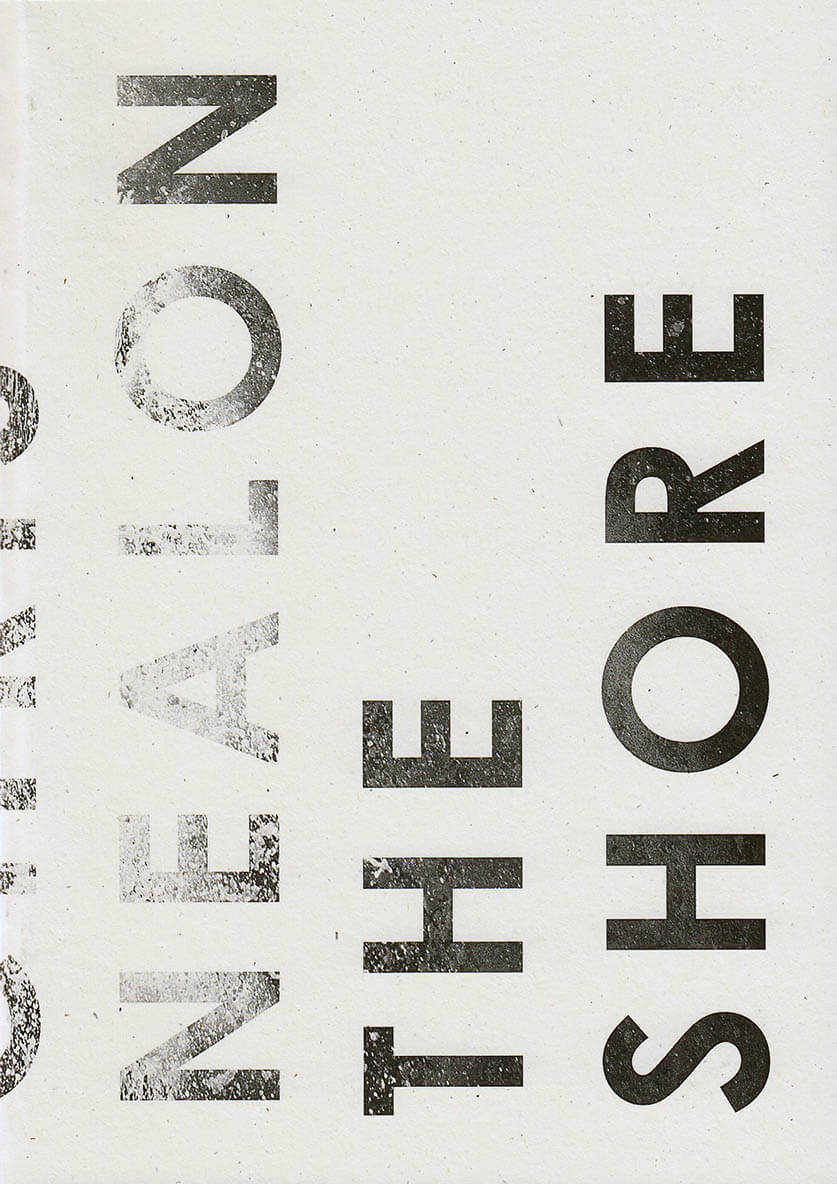
The Shore
The five poem-essays of Chris Nealon's The Shore give space and voice to the complexity of contemporary life, admitting bafflement and dismay but also creating openings for indiscreet hope. Queer and anti-capitalist, they urge us not to be ruled by our fears, while always ethically navigating the forces—race, class, age, gender, and others—that put us each in different places of power. Nimbly exploring connections among beauty, friendship, and politics, The Shore gives our era of crisis a language at once vernacular and philosophical, in a form that's both teeming and fluid.
Chris Nealon is Professor of English at Johns Hopkins University. He is the author of The Shore (Wave Books, 2020) as well as two books of literary criticism, Foundlings: Lesbian and Gay Historical Emotion before Stonewall (Duke, 2001) and The Matter of Capital: Poetry and Crisis in The American Century (Harvard, 2011), as well as three earlier books of poetry: The Joyous Age (Black Square Editions, 2004), Plummet (Edge Books, 2009), and Heteronomy (Edge, 2014). He lives in Washington, DC.

Where Are the Tiny Revolts?
Anthony Huberman, Jeanne Gerrity
Where are the tiny revolts? is the first book in a new annual series published by CCA Wattis Institute, a contemporary art center and research institute in San Francisco. Each book in the series is driven by a central question: what are we learning from artists today? Unconnected to an exhibition program, Where are the tiny revolts? is rooted in the Wattis's artist-driven research institute. It is a place to explore and share some of the texts and visual work that emerge over the course of an entire year of discussions and public programs. Instead of providing documentation of projects with artists, Where are the tiny revolts? offers other ideas, voices, and references generated by conversations with and about artists.
The first book in the series, informed by themes related to the work of Dodie Bellamy, revolves around questions related to contemporary forms of feminism and sexualities, the rebirth of the author, and ways in which vulnerability, perversion, vulgarity, and self-exposure can be forms of empowerment. The texts cover a broad array of styles, including memoir, theoretical essay, art historical analysis, poetry, and fiction. The visual elements are equally diverse, ranging from photographs to collage to drawing.
Texts by Sara Ahmed, Nicole Archer, Georges Bataille, Dodie Bellamy, Michele Carlson, Thomas Clerc, Combahee River Collective, Bob Flanagan, Ursula K. Le Guin, Johanna Hedva, Glen Helfand, Juliana Huxtable, Alex Kitnick, Julia Kristeva, Audre Lorde, Lisa Robertson; contributions by Marcela Pardo Ariza, Justin G. Binek, Kaucyila Brooke, Tammy Rae Carland, Mary Beth Edelson, Mike Kuchar, Anne McGuire, Patrick Staff, Frances Stark, Rosemarie Trockel.
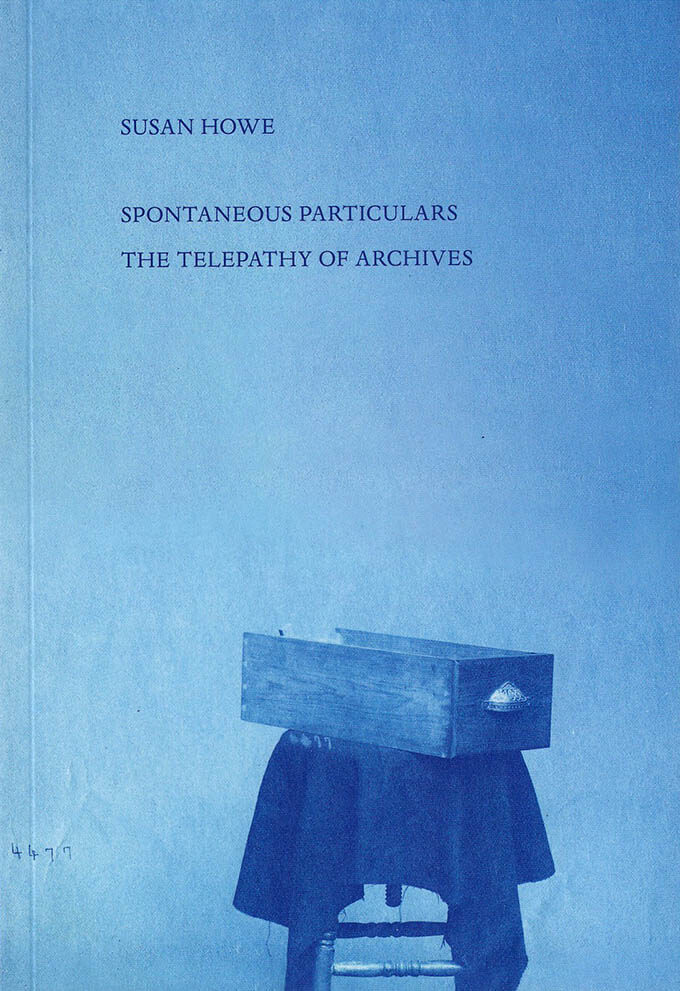
Spontaneous Particulars: Telepathy of Archives
Great American writers — William Carlos Williams, Jonathan Edwards, Emily Dickinson, Noah Webster, Hart Crane, Wallace Stevens, Henry James —in the physicality of their archival manuscripts (reproduced here in the beautiful facsimiles)—are the presiding spirits of Spontaneous Particulars: Telepathy of Archives.
Also woven into Susan Howe’s long essay are beautiful photographs of embroideries and textiles from anonymous craftspeople. The archived materials create links, discoveries, chance encounters, the visual and the acoustic shocks of rooting around amid physical archives. These are the telepathies the bibliomaniacal poet relishes. Rummaging in the archives she finds “a deposit of a future yet to come, gathered and guarded…a literal and mythical sense of life hereafter—you permit yourself liberties —in the first place—happiness.” Digital scholarship may offer much for scholars, but Susan Howe loves the materiality of research in the real archives, and Spontaneous Particulars “is a collaged swan song to the old ways.”
Memorably fierce: with her long career in view today, her comment on Dickinson, in 1985, applies to Howe herself: 'A great poet, carrying the antique imagination of her fathers, requires of each reader to leap from a place of certain signification, to a new situation, undiscovered and sovereign. She carries intelligence of the past into future of our thought by reverence and revolt. — Langdon Hammer
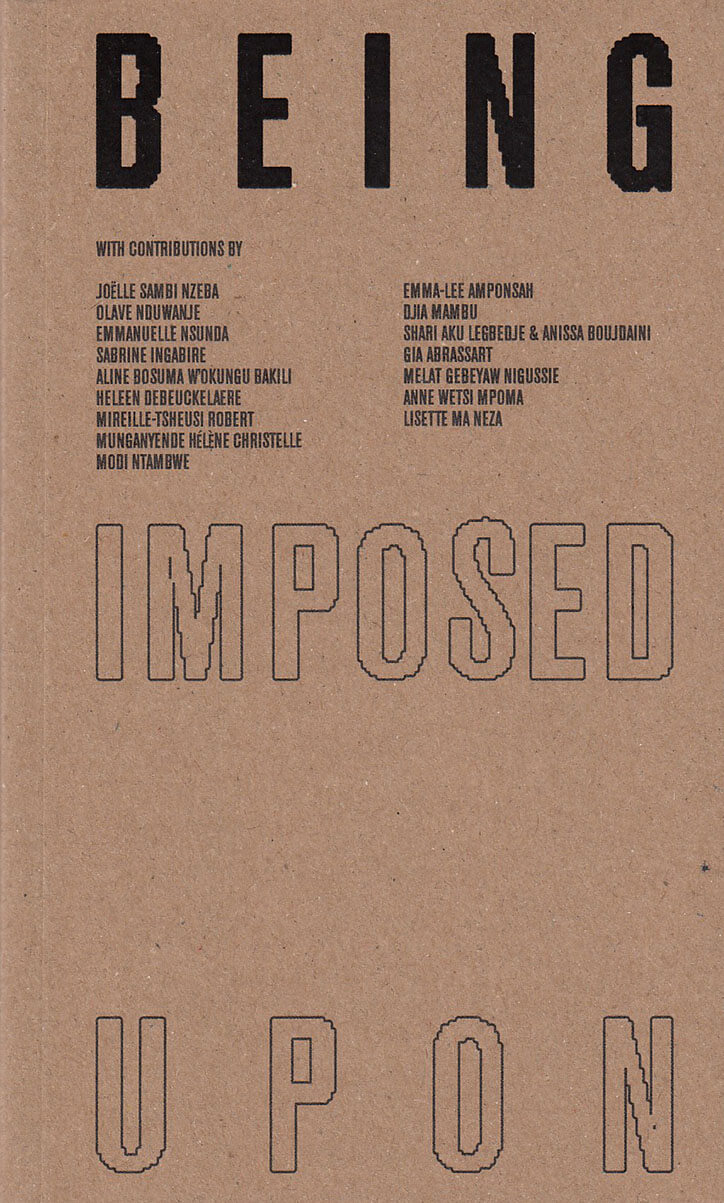
Being Imposed Upon
Being is een tijdloze liefdesbrief en handleiding van en voor zwarte vrouwen. Dit boek is een collectie van reflecties over vrouw- én zwart-zijn in België. In de twee landstalen Nederlands en Frans verenigen wij, zwarte vrouwen, non-fictie essays, literaire beschouwingen, poëzie, activistische en academische teksten rond onze zoektocht naar vrijheid. Dit boek is een eerbetoon aan onze ouderen, onze heldinnen en onze zusters.
///
Nous sommes des Femmes Noires, poétesses, militantes, universitaires, littéraires et essayistes engagées dans des causes afroféministes, antiracistes et décoloniales.
Nous sommes ces Afro-belges néerlandophones et francophones indignées par des siècles d’esclavages coloniaux, de violences et de discriminations raciales.
Nous sommes ces Afrodescendantes qui marquent ici le refus des diverses formes d'impositions qu’elles subissent structurellement et quotidiennement.
Nous sommes ces Femmes aux identités Tierces que l’on oppresse et qui pourtant, à l’aune de l’érosion du pouvoir des bourreaux sur nos corps, nos âmes et nos esprits, réfléchissent à leur condition et travaillent à leur empowerment.
Nous sommes ces Africaines stigmatisées, invitées à rejeter nos origines et qui pourtant vous livrent ici une lettre d’amour intemporelle à toutes les Femmes Noires, à celles qui ont peur et celles luttent.
Nous sommes ces immortelles qui rendront hommage à nos aînées, nos héroïnes, à notre filiation de Résistances. Ce manuel d’émancipation trace les chemins de notre liberté et de notre résilience ; par nous, pour nous !
Impose our freedom.
- Mireille-Tsheusi Robert
Auteurs
Joëlle Sambi Nzeba, Olave Nduwanje, Emmanuelle Nsunda, Sabrine Ingabire, Aline Bosuma W’Okungu Bakili, Heleen Debeuckelaere, Mireille-Tsheusi Robert, Munganyende Hélène Christelle, Modi Ntambwe, Emma-Lee Amponsah, Djia Mambu, Shari Aku Legbedje & Anissa Boujdaini, Gia Abrassart, Melat Gebeyaw Nigussie, Anne Wetsi Mpoma, Lisette Ma Neza